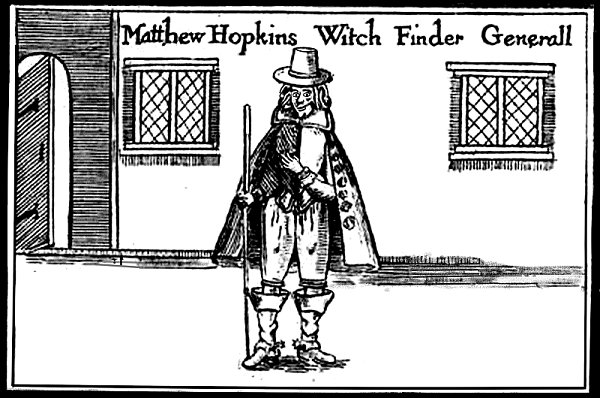

Can we moderns gain a flavour of the Puritans? One of the best films to portray Puritans in village life is the Hammer Horror Witchfinder General starring Vincent Price. It is sexed-up and based on a novel; authentic it is because Matthew Hopkins was a real and terrifying Puritan, born about 1620. The family owned land, including at Framlingham, on which stands a Unitarian church. My mother and I stayed at Framlingham within a holiday (writes Adrian Worsfold).
During the Civil War Hopkins became a freelance witch-hunter in Essex, after moving to Manningtree and hearing women discussing seeing the Devil. Charles I had made witch-hunting very evidence dependent, and its frequency had died down. Thus Hopkins caused more to be executed for accused witchcraft within three years than had been killed within the previous hundred.
He considered he was doing God's work. Beginning with associate John Sterne, he got results. Communities who disliked the needy or troublesome created targets for Hopkins. His technique was sleep deprivation, and after three days Elizabeth Clerk confessed to making a pact with the Devil, which was the key confession. She led to others and fifteen were chained at Colchester Castle, and Rebecca West turned evidence on the rest to see them hang to die by strangulation. After Elizabeth Clerk, Hopkins self-styled himself "The Witchfinder General", and was operating but unofficially across East Anglia. Stearne was joined by another four "prickers" of the accused flesh. The communal mob picked out bothersome individuals.
However, an editorial of the (Puritan side) Moderate Intelligencer of 4th to 11th September 1645 expressed unease with the witch trial in Bury St. Edmunds.
Hopkins' biggest prize was a hated vicar, the Reverend John Lowes, whose sleep deprivation was also combined with forced walking. The eighty year old did not crack, so was illegally plunged in and out of the moat at Framlingham Castle until he did, on the basis of James I's writing that those who had made a pact with the devil would force away the waters of Baptism and thus float whilst those saved would sink. Although Lowes confessed to association, he did not confess to a pact. Along with ninety others, he was hung.
It was another Puritan minister that led to Hopkins' undoing. Rev. John Gaule, Vicar of Great Staughton, preached against Hopkins, so a parishioner received a threatening letter about Gaule, reminding about Lowes’ conviction. Gaule published about Hopkins’ incompetence and self-interest, given that Hopkins received a hefty fee for every conviction.
The matter went to a Norfolk court with Westminster justices, and evidence included Hopkins' "Lucrating skill" (money making) as well as asking how Hopkins could know so much about witchcraft. Hopkins then produced a book, The Discovery of Witches, to repeat the accusations, with his replies, still lying about the level of his fees. Meanwhile, because he and trials with punishments were so expensive, towns had to raise taxes to kill the people the locals wanted to dispatch. Such would not do, and Hopkins ran out of business and he retired. And then in 1647 he died of tuberculosis in Manningtree, for some a godly sign.
Hopkins work and book was an immediate inspiration in witchfinding executions in the American Puritan colonies leading to the killing of twenty people as witches in Salem, Massachusetts, 1692–93.
Here's how much things have changed! Unitarianism now includes neo-Paganism as one strand. In Hull we knew two full Pagans participating in covens north and south of the Humber, one a member, that took on Unitarian training in York, and her friend, an occasional attender.
Framlingham Unitarians' Meeting House (IP13 9AJ) was a purpose-built Puritan-style 'preaching box' built in 1717 by a continuing congregation of Protestant Dissenters. It became Unitarian in 1813 and was later 'turned' ninety degrees with the box pews removed for benches, and turned back by 2011. Recently associated with Ipswich it now shares ministry with Bury St. Edmunds.
Adrian Worsfold
Pluralist - Liberal and Thoughtful